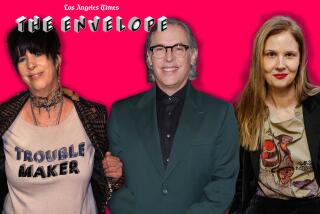Oscar Winner Steve Tesich Just Says No to Hollywood Violence : Lecture: Speaking at Chapman, the ‘Breaking Away’ screenwriter says he rejects most film projects offered him.
- Share via
ORANGE — Steve Tesich may be a successful screenwriter, but he has conflicted feelings about Hollywood. Great place to get ahead, great place to make pots of money--but not always such a great place for an idealist.
The artistic compromises can be so severe that Tesich, who won an Oscar for his “Breaking Away” script in 1979, says he spends much of his time turning down offers.
“Movies I won’t do and won’t see begin with this ,” Tesich said Friday night after his lecture at Chapman University, raising his hand to symbolize a gun.
“There’s too much violence. There aren’t any (films) that deal with rape without promoting it--they glorify it like a number from a musical. You become saturated by it all.”
Tesich, at Chapman for two weeks while teaching an advanced writing class as the campus’ screenwriter-in-residence, added that writers are also worn down by the industry’s reliance on quick, easy resolutions.
“I also avoid (projects) that are too simplistic,” he said. “There are too many formulas. I don’t want life to be (portrayed as) a Beckett play, but I do want balance. People . . . need that balance.”
Not surprisingly, Tesich pointed to greed as the prime evil. “It’s always the bottom line. (The studios) aren’t even happy with a little money; everything has to be a blockbuster.”
These days, Tesich, 50, is busy finishing his novel, titled “Karoo” and set in the United States. That doesn’t mean he’s given up on films; considering Tesich’s history, the Hollywood pull is strong, despite his reservations.
Tesich, a Yugoslavia native who came to the United States at 13, started writing for the New York theater scene in the late ‘60s. He wrote six plays produced Off Broadway and had something of a hit with “Division Street,” which was creamed by critics but has since enjoyed a revival afterlife on stages across the country.
Then came “Breaking Away,” Tesich’s first screenplay. The coming-of-age movie, starring Dennis Christopher and Dennis Quaid, wasn’t a huge box-office winner, but it did set Tesich’s career on a new and lucrative path.
He went on to adapt John Irving’s “The World According to Garp,” and also wrote “American Flyers,” “Eleni” and “Four Friends,” among others.
*
While recalling those pictures, Tesich said he had special affection for “Breaking Away” and “Garp.”
“The first of anything--your first love, your first girlfriend--always mean the most, so ‘Breaking Away’ is my favorite,” he explained. “And ‘Garp’ I love a lot because it was such a wonderful experience. It also started a lot of nice things for some talented people, like Robin Williams and Glenn Close.”
That was the sort of reflection the Chapman Auditorium audience seemed to crave. The questions following Tesich’s 45-minute talk, which dwelt on the plight of America more than the bright of Hollywood, tended to focus on the author’s experiences rather than his politics.
Tesich, however, wasn’t interested in rehashing his career but opened up a bit when asked why he writes.
“I became a writer to survive as a human being,” Tesich said with a small grin. “I write out of necessity, not compulsion. I do it so I can be decent to everybody else, including my family. It really keeps me together and happy.”
As for what he prefers to create--novels, plays or screenplays--Tesich said each provided joy.
“I certainly don’t think novels have more artistic merit than screenwriting,” he noted. “A film by Bergman can mean as much to me as a book by Dostoevsky.”
*
During his lecture, which Tesich called “a State of the Union by a private citizen,” the author criticized this country for not addressing urban decay and for seeking simple solutions to complicated problems abroad. He also questioned why the culture makes media figures, if not heroes, out of such people as Oliver North.
“This glorifies . . . the person who can get away” with taking an outlaw path, Tesich said, later adding that “we are living in a glitzy dark age. The information highway won’t help us in where to go. . . . We have a lack of vision and unity.”
More to Read
The biggest entertainment stories
Get our big stories about Hollywood, film, television, music, arts, culture and more right in your inbox as soon as they publish.
You may occasionally receive promotional content from the Los Angeles Times.










